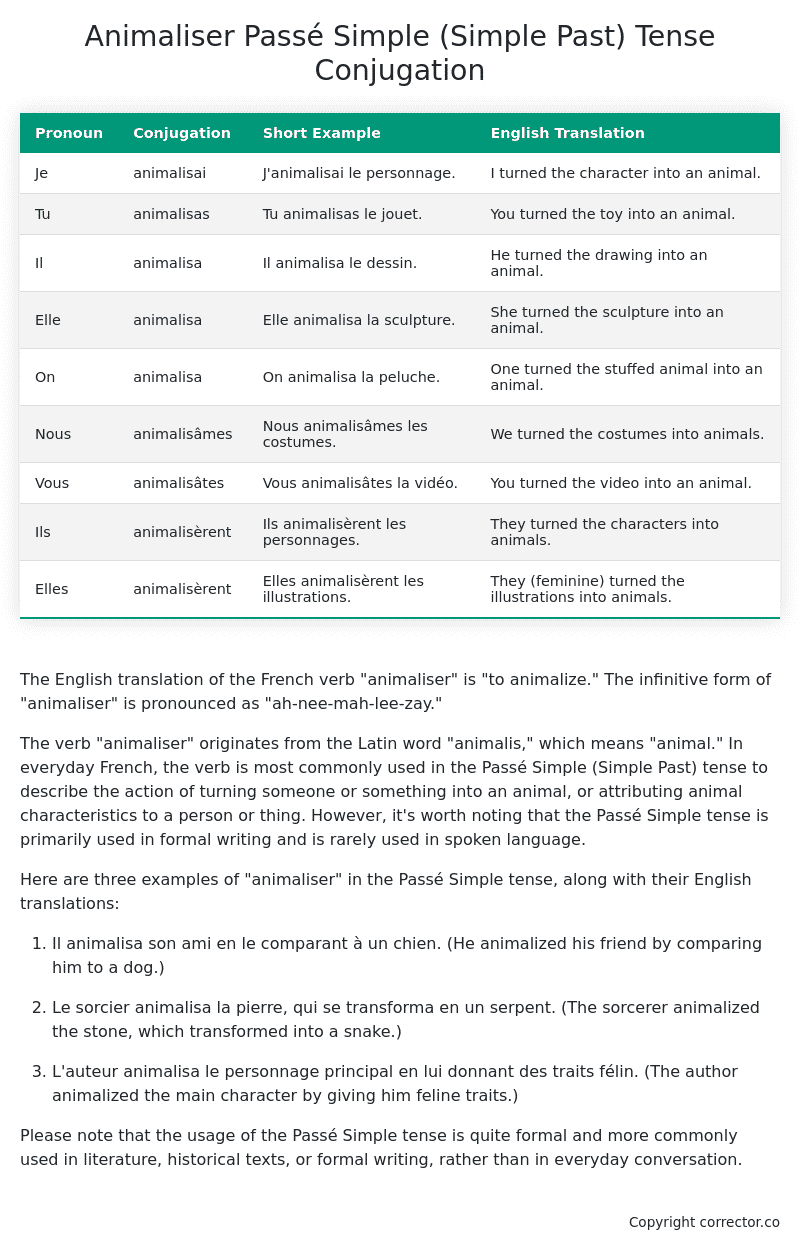Passé Simple (Simple Past) Tense Conjugation of the French Verb animaliser
Introduction to the verb animaliser
The English translation of the French verb “animaliser” is “to animalize.” The infinitive form of “animaliser” is pronounced as “ah-nee-mah-lee-zay.”
The verb “animaliser” originates from the Latin word “animalis,” which means “animal.” In everyday French, the verb is most commonly used in the Passé Simple (Simple Past) tense to describe the action of turning someone or something into an animal, or attributing animal characteristics to a person or thing. However, it’s worth noting that the Passé Simple tense is primarily used in formal writing and is rarely used in spoken language.
Here are three examples of “animaliser” in the Passé Simple tense, along with their English translations:
-
Il animalisa son ami en le comparant à un chien.
(He animalized his friend by comparing him to a dog.) -
Le sorcier animalisa la pierre, qui se transforma en un serpent.
(The sorcerer animalized the stone, which transformed into a snake.) -
L’auteur animalisa le personnage principal en lui donnant des traits félin.
(The author animalized the main character by giving him feline traits.)
Please note that the usage of the Passé Simple tense is quite formal and more commonly used in literature, historical texts, or formal writing, rather than in everyday conversation.
Table of the Passé Simple (Simple Past) Tense Conjugation of animaliser
| Pronoun | Conjugation | Short Example | English Translation |
|---|---|---|---|
| Je | animalisai | J’animalisai le personnage. | I turned the character into an animal. |
| Tu | animalisas | Tu animalisas le jouet. | You turned the toy into an animal. |
| Il | animalisa | Il animalisa le dessin. | He turned the drawing into an animal. |
| Elle | animalisa | Elle animalisa la sculpture. | She turned the sculpture into an animal. |
| On | animalisa | On animalisa la peluche. | One turned the stuffed animal into an animal. |
| Nous | animalisâmes | Nous animalisâmes les costumes. | We turned the costumes into animals. |
| Vous | animalisâtes | Vous animalisâtes la vidéo. | You turned the video into an animal. |
| Ils | animalisèrent | Ils animalisèrent les personnages. | They turned the characters into animals. |
| Elles | animalisèrent | Elles animalisèrent les illustrations. | They (feminine) turned the illustrations into animals. |
Other Conjugations for Animaliser.
Le Present (Present Tense) Conjugation of the French Verb animaliser
Imparfait (Imperfect) Tense Conjugation of the French Verb animaliser
Passé Simple (Simple Past) Tense Conjugation of the French Verb animaliser (You’re reading it right now!)
Passé Composé (Present Perfect) Tense Conjugation of the French Verb animaliser
Futur Simple (Simple Future) Tense Conjugation of the French Verb animaliser
Futur Proche (Near Future) Tense Conjugation of the French Verb animaliser
Plus-que-parfait (Pluperfect) Tense Conjugation of the French Verb animaliser
Passé Antérieur (Past Anterior) Tense Conjugation of the French Verb animaliser
Futur Antérieur (Future Anterior) Tense Conjugation of the French Verb animaliser
Subjonctif Présent (Subjunctive Present) Tense Conjugation of the French Verb animaliser
Subjonctif Passé (Subjunctive Past) Tense Conjugation of the French Verb animaliser
Subjonctif Imparfait (Subjunctive Imperfect) Tense Conjugation of the French Verb animaliser
Subjonctif Plus-que-parfait (Subjunctive Pluperfect) Tense Conjugation of the French Verb animaliser
Conditionnel Présent (Conditional Present) Tense Conjugation of the French Verb animaliser
Conditionnel Passé (Conditional Past) Tense Conjugation of the French Verb animaliser
Conditionnel Passé II (Conditional Past II) Tense Conjugation of the French Verb animaliser
L’impératif Présent (Imperative Present) Tense Conjugation of the French Verb animaliser
L’impératif Passé (Imperative Past) Tense Conjugation of the French Verb animaliser
L’infinitif Présent (Infinitive Present) Tense Conjugation of the French Verb animaliser
L’infinitif Passé (Infinitive Past) Tense Conjugation of the French Verb animaliser
Le Participe Présent (Present Participle) Tense Conjugation of the French Verb animaliser
Le Participe Passé (Past Participle) Tense Conjugation of the French Verb animaliser
Struggling with French verbs or the language in general? Why not use our free French Grammar Checker – no registration required!
Get a FREE Download Study Sheet of this Conjugation 🔥
Simply right click the image below, click “save image” and get your free reference for the animaliser Passé Simple tense conjugation!

Animaliser – About the French Passé Simple (Simple Past) Tense
Formation
Usage
Narration
Historical Context
Interactions with other tenses
Passé Composé
Imparfait
Conditional and Subjunctive
Summary
I hope you enjoyed this article on the verb animaliser. Still in a learning mood? Check out another TOTALLY random French verb conjugation!


